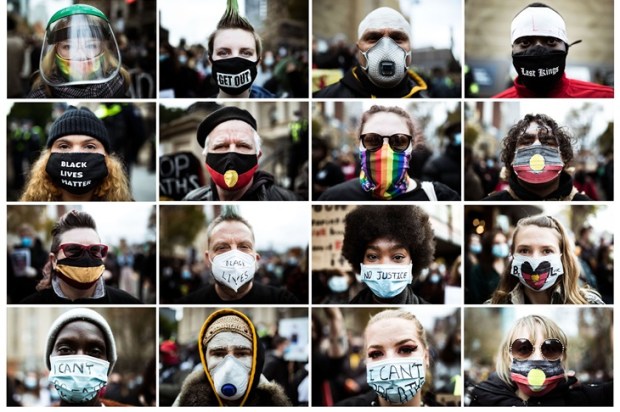‘Can you please take off the face nappies?’ the workshop coordinator’s reading glasses magnify his eyes so they resemble a frog’s. ‘My hearing isn’t 100 per cent so I actually need to see your lips moving.’
He glances around the room at the six students, one hand making a chatterbox gesture. Slowly, people begin reaching for the straps hooked around the backs of their ears. Above the array of coloured cloth and blue surgical masks, jumpy gazes suggest the telepathic conversation occurring across the desk:
‘Is this really OK?’
‘I guess so: I mean, the professor said.’
‘You know we’re buggered if someone actually has Covid…’
‘If one of us already has it, we’ll be breathing the same air for the next two hours.’
‘What if security comes?’
‘Just say the coordinator has hearing difficulties.’
‘But I can’t see hearing aids.’
‘Don’t be superficial!’
Everyone knows that people have been playing it fast and loose with Covid rules. Around the office, the blinds are pulled down. Many sit bare-faced at their monitors behind dividers in open-plan offices. Masks hang off pins on the corkboard near people’s desks or dangle of their wrists. Office workers sit in silent agreement about keeping the Covid mask-free secret. Everyone knows that this happens in offices across the country. The government knows it happens. Politicians know that we know that they know…
When laws reach intimate settings, it is no longer ‘the government’ with more power to suppress individual freedom.
‘The government’ as a whole is not a valid social actor. The true death knell of a free society is when citizens choose zealotry – regardless of political leaning – over critical analysis and common sense.
Restrictions in private settings allow citizens the opportunity to elevate themselves into moral and legal authorities. They can either choose to shame colleagues, friends, and neighbours on national news. Or they can choose to make concessions with one another about rules that seem arbitrary or unsuited to the environment. Does quiet defiance make you and your colleagues negligent, cold-blooded murderers who are willing to dangle immunocompromised and elderly people off cliffs? Or is your collusion a testament to the high social trust and exercise of common sense among your group? Only you know the answer.
This article is unconcerned with seeking conclusions to questions such as ‘do masks actually reduce transmission?’, ‘do vaccinations even work?’, or ‘why should we mandate vaccination if vaccinated people can pass on the virus?’ Health experts and politicians have cobbled arguments for either side. The evidence in support of Covid-related mandates might be medical (the rate of serious symptoms compared across unvaccinated versus vaccinated samples) or psychological (the thermometer as a visual reminder for parents to keep feverish children from school, masks as deterrents to excessive mingling that can increase infection likelihood). Evidence against Covid-related mandates also covers medical and psychological dimensions. Medical arguments suggest that vaccine mandates are nonsensical because vaccinated people can pass on the virus. Psychological arguments against the mask mandate might suggest that even if masks ‘work’, most people cannot realistically follow proper mask-wearing protocols (such as never touching the front of a mask or reusing a mask) that would maintain the promised protection.
Instead, this article is about the unseen damage to social trust in the methods used to reach certain ends.
The stated political ends have included ‘Covid-Zero’ and ‘living with Covid’, both of which amount to the elimination of Covid as a threat. To reach said ends, governments can easily announce policies, only to amend or scrap them within hours. Social trust is different: it requires patient negotiation and cultural narratives built over decades.
Hartman-Caverly’s article notes that, ‘Covid mandates upend a century of norms around informed consent, coerce conformity, and banish the non-compliant, with profound implications for viewpoint diversity in the academy.’ She then discusses ironic cases of medical ethics experts being shunned from universities for daring to discuss rather than wholeheartedly accept the basis and legitimacy of Covid mandates. If medical ethics experts, whose job it is to debate public health issues, are prohibited from questioning Covid mandates, the message is that no one is above commands that employ the magic word ‘Covid’. Even if Covid policies achieve their purpose, the mere act of enacting them may fragment cultural norms about independent discussion and expectations about social etiquette.
Throughout the pandemic, behaviour we would have condemned as gross privacy invasion, rudeness, and psychopathology have been lauded as moral exercises undertaken by accountability watchdogs.
We have each seen various examples of such misbehaviour posturing as public health justice. A patient tries to sue a doctor for allegedly washing her hands for 18 seconds instead of the prescribed 20 seconds. A customer yells at a pharmacist for wearing a surgical mask instead of an N95. A patron demands an unmasked waitress elaborate on her medical exception. Socially and economically disadvantaged zones like Western Sydney are further alienated from the rest of the capital. Their unique attributes such as extended family networks and non-English speaking households are met with intensified surveillance and punishment, rather than culturally attuned problem-solving attempts.
Apparently, these displays of ignorance and discrimination are for the ‘greater good’.
There have, of course, been exceptional examples of communal altruism such as food charity drives and voluntary delivery services for those most vulnerable to serious complications from Covid. However, there is also an overwhelming sense of fear backed by images of military forces in civilian environments, eerily desolate city centres, and interpersonal hostility as people jostle for supplies at supermarkets.
We may one day stamp out the threat of Covid using our current measures. But what if the cost is social trust, basic etiquette, and lowered expectations about the amount of privacy afforded to individuals? These factors cannot be measured in quantitative scales the way GDP or death counts can be. Instead, solidarity gradually dissolves when we reward pathological anxiety and self-entitlement.
As well as being a source of anxiety itself, the pandemic has been an opportunity for people to act out existing behavioural and personality issues. Perhaps, after the ordeal is over, we will start wondering why our children are paranoid, anti-social hypochondriacs, in the same way that people now wonder about Gen-Z’s ideological and psychological fragility.
To borrow the words of social psychologist Jonathan Haidt, our good intentions may be setting up a generation for failure – again.
Got something to add? Join the discussion and comment below.
Get 10 issues for just $10
Subscribe to The Spectator Australia today for the next 10 magazine issues, plus full online access, for just $10.


























Comments
Don't miss out
Join the conversation with other Spectator Australia readers. Subscribe to leave a comment.
SUBSCRIBEAlready a subscriber? Log in